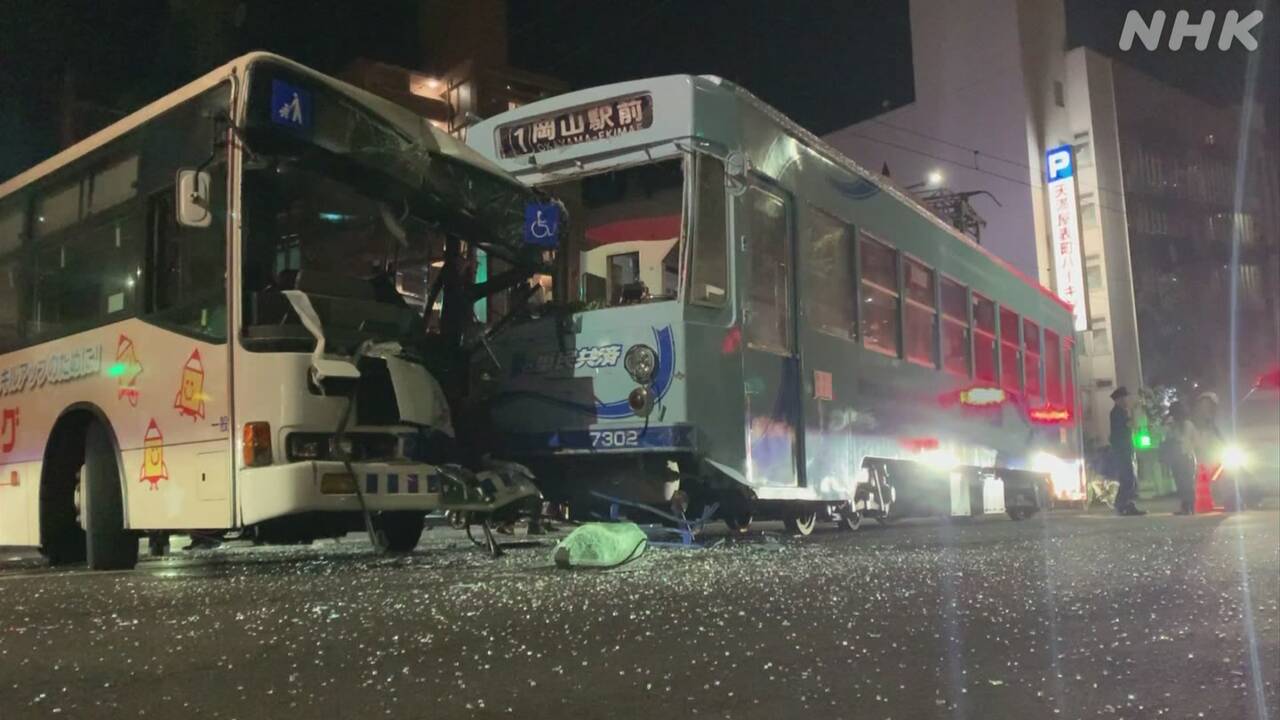Published: 2025-09-15 23:30
岡山 路面電車と路線バスが衝突 2人けが

岡山市の中心部で路面電車と路線バスが衝突する事故があり、路面電車の運転士とバスの乗客のあわせて2人がけがをして病院に搬送されました。いずれも意識はあり、命に別状はないということで、警察は事故の状況を詳しく調べています。
15日午後8時半ごろ、岡山市北区表町の交差点で、いずれも岡山電気軌道が運行する路面電車と路線バスが衝突しました。
警察によりますと、この事故で路面電車の運転士とバスの乗客1人のあわせて2人がけがをして病院に搬送されましたが、いずれも意識はあり命に別状はないということです。
岡山電気軌道によりますと、事故当時、バスには乗客1人が乗っていて、路面電車に乗客は乗っていなかったということです。
NHKが撮影した映像では、路面電車は脱線していて、路線バスは前方の左側の部分が大きく壊れている様子が確認できます。
警察によりますと、路面電車の対向車線側にいた路線バスが、右折しようとして衝突したということです。
警察は事故の状況を詳しく調べています。
現場は、JR岡山駅から南東に1キロ余り離れた岡山市中心部の繁華街の近くです。
「ドーンという爆発のような音がした」
事故当時、現場の近くにいた男性は「ドーンという、爆発のような音がした。電車の運転士は顔などにけがをしていた。こんな事故は見たことがない。車に乗っているので、気をつけようと思った」と話していました。
| # | 言葉 | 意味 |
|---|---|---|
| 7 | 路面電車 | ろめんでんしゃ (路面電車) : tram; streetcar; trolley; tramcar |
| 4 | 路線 | ろせん (路線) : 1. route (bus, train, air, etc.); line 2. line (taken by a group, organization, etc.); policy; course |
| 4 | 乗客 | じょうきゃく (乗客) : passenger |
| 3 | 岡山市 | おかやまし (岡山市) : Okayama (city) (place) |
| 3 | 衝突 | しょうとつ (衝突) : 1. collision; crash; running into 2. conflict; quarrel; clashing |
| 3 | 運転士 | うんてんし (運転士) : 1. (professional) driver (of a taxi, train, etc.); motorman 2. mate (on a ship); officer |
| 3 | いずれ | いずれ (何れ) : 1. where; which; who 2. anyway; anyhow; at any rate |
| 3 | 乗る | のる (乗る) : 1. to get on (train, plane, bus, ship, etc.); to get in; to board; to take; to embark 2. to get on (e.g. a footstool); to step on; to jump on; to sit on; to mount |
| 2 | 中心部 | ちゅうしんぶ (中心部) : central part; heart (of a city) |
| 2 | あわせる | あわせる (会わせる) : 1. to make (someone) to meet; to let (someone) meet 2. to expose to; to subject to |
| 2 | 搬送 | はんそう (搬送) : 1. transportation; conveyance; delivery 2. hospitalization; transfer to hospital |
| 2 | 意識 | いしき (意識) : 1. consciousness 2. becoming aware (of); awareness; sense |
| 2 | 命 | いのち (命) : 1. life; life force 2. lifetime; lifespan |
| 2 | 別状 | べつじょう (別状) : something unusual; something wrong; mishap; accident; serious condition (e.g. after an injury); different situation |
| 2 | 状況 | じょうきょう (状況) : state of affairs (around you); situation; circumstances |
| 2 | 詳しく | くわしく (詳しく) : in detail; fully; minutely; at length |
| 2 | 調べる | しらべる (調べる) : to examine; to look up; to investigate; to check up; to sense; to study; to inquire; to search |
| 2 | 岡山 | おかやま (岡山) : Okayama (city, prefecture) |
| 2 | 電気 | でんき (電気) : 1. electricity 2. (electric) light |
| 2 | 軌道 | きどう (軌道) : 1. orbit; trajectory 2. railroad track |
| 2 | 当時 | とうじ (当時) : at that time; in those days |
| 2 | 現場 | げんば (現場) : 1. actual spot; scene; scene of the crime; site; location; setting 2. shop floor; factory floor; (on) site |
| 2 | 爆発 | ばくはつ (爆発) : 1. explosion; detonation; eruption 2. eruption (of discontent, etc.); outburst; outpouring |
| 1 | 時半 | じはん (時半) : half past (the hour) |
| 1 | 北区 | きたく (北区) : Kitaku (place) |
| 1 | 表町 | おもてちょう (表町) : Omotechō (place) |
| 1 | 運行 | うんこう (運行) : 1. service (bus, train); operation 2. motion; revolution; movement |
| 1 | 撮影 | さつえい (撮影) : photography (still or motion); photographing; filming; shooting; (video) recording |
| 1 | 映像 | えいぞう (映像) : 1. image (on a screen); picture (e.g. on a TV) 2. video; film; footage |
| 1 | 脱線 | だっせん (脱線) : 1. derailment 2. digression; deviation |
| 1 | 前方 | ぜんぽう (前方) : 1. forward; frontward; ahead 2. rectangular front |
| 1 | 左側 | ひだりがわ (左側) : left side; left-hand side |
| 1 | 部分 | ぶぶん (部分) : portion; section; part |
| 1 | 大きく | おおきく (大きく) : in a big way; on a grand scale |
| 1 | 壊れる | こわれる (壊れる) : 1. to be broken; to break 2. to fall through; to come to nothing |
| 1 | 様子 | ようす (様子) : 1. state; state of affairs; situation; circumstances 2. appearance; look; aspect |
| 1 | 確認 | かくにん (確認) : confirmation; verification; validation; review; check; affirmation; identification |
| 1 | 対向車線 | たいこうしゃせん (対向車線) : opposite lane; oncoming lane; opposite side of the road |
| 1 | 右折 | うせつ (右折) : turning to the right; right turn |
| 1 | 岡山駅 | おかやまえき (岡山駅) : Okayama Station (station) |
| 1 | 南東 | なんとう (南東) : southeast |
| 1 | 余り | あまり (余り) : 1. remainder; remnant; rest; balance; surplus; remains (of a meal); leftovers 2. (not) very; (not) much |
| 1 | 離れる | はなれる (離れる) : 1. to be separated; to be apart; to be distant 2. to leave; to go away |
| 1 | 繁華街 | はんかがい (繁華街) : business district; shopping district; bustling street; shopping centre; shopping center; downtown |
| 1 | 思う | おもう (思う) : 1. to think; to consider; to believe; to reckon 2. to think (of doing); to plan (to do) |
| 1 | 話す | はなす (話す) : 1. to talk; to speak; to converse; to chat 2. to tell; to explain; to narrate; to mention; to describe; to discuss |